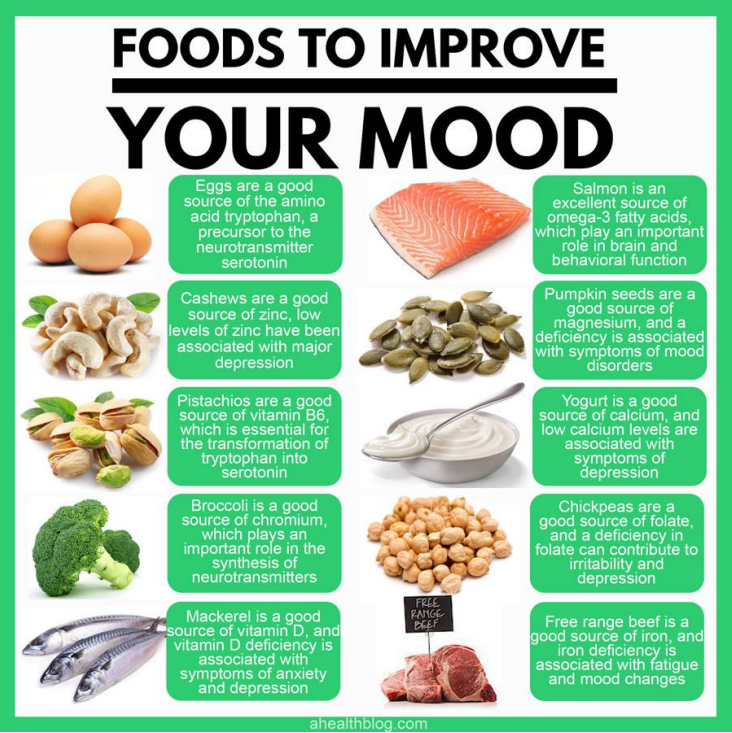Eating Healthy Means Living Healthy
Maintaining a healthy and stable psychological state goes far beyond keeping just your mind at ease and your body in good shape. Keeping a clear and peaceful state of mind means that the nutrients that we are inputting into our brain, both from an external source such as the sun and from nature, and actions that we take ourselves that impact our body are spreading positivity and enrichment to our physical body and our mental wellbeing.
One of the most clear cut solutions to keeping your mental state grounded and less agitated is by keeping the vitamins and minerals in your diet at a steady and healthy balance. What if in addition to prescribing several medications to a depressed individual, doctors also recommend that patients eat a variety of natural fruits and vegetables to replenish the lost nutrients. There are twelve vitamins and minerals which are listed in the depressant nutrient profiling system that could potentially prevent or treat symptoms of depression.
The twelve vitamins and minerals are Vitamins B12, B9, B1, B6, Iron, Zinc, Potassium, Selenium, Magnesium, Potassium, Vitaman A, and long-chain polyunsaturated fatty acids. There are certain diets that may cause a risk of overconsuming or underconsuming certain vitamins and minerals. For example, people on vegetarian or vegan-based diets are at the highest risk of consuming too little zinc. Over time this could be extremely dangerous, which may end up developing into symptoms of a common cold, an inability to heal, and macular degeneration (damage to the retina causing vision impairments) among other things.
While this may scare some people who are on a vegan or vegetarian-based diet, they should not be concerned at all: the damage is completely reversible with only a change in diet. That being said, this change won’t happen over night or without a little bit of effort on your part. It is important that if you notice a deficiency of one or several vitamins and minerals that you identify the insufficient vitamin or mineral and replenish them as soon as possible.
Before you dive in, remember that our professionals are always here to help
Food Impacts on our Mood and our Mental Health
As you can see from the diagram above, the foods that we consume have a significant impact on our mood and our mental health. Millions of neurons connect our brain and gut microbiome the most important of which is the Vagus Nerve. As a nation, if we understand the relationship between our brain and our gut and how the brain affects the nerve, we may be able to decrease our risk for heart disease, obesity, diabetes, high blood pressure etc.
Highest Rates of Obesity in the World
As we reflect on the types of foods that we as a nation and as an individual are consuming, it is really disappointing, yet easy to understand why the United States has one of the highest rates of obesity in the world and is amongst the top 5 in highest rates of obesity amongst the industrialized nations. Not only that, but another side effect of the amount of fast food that the American public is eating is a direct correlation to the frequency of clinically depressed individuals in the United States. Although other countries such as Ukraine and Australia have a slightly higher rate of depression in their countries compared to that of the United States, both countries have a significantly smaller population, so the gross number of clinically depressed individuals in Ukraine and Australia is substantially fewer than that of the United States.
Eating a Balanced Diet
However, just by simply eating a balanced diet while also avoiding certain foods such as sugary beverages and processed and high-fat meats like beef and steak can help ensure a longer life by decreasing your likelihood of developing chronic illnesses and diseases such as diabetes, heart disease, and even cancer. And, just to clarify, for the millions of Americans who consume meat on a daily basis, it does not mean that you have to quit eating meat or red meats altogether. A small alteration in the types of meat that Americans consume will have a substantial impact on the environment and your own personal health.
Foods to Boost Mental Health
By switching from high-fat meats which include beef and steak to healthier meat such as fish and chicken can decrease symptoms of anxiety and depression. If you choose to eat beef products, it is recommended that you consume beef from grass-fed cows as they are a good source of protein and amino acids and not pumped up with a bunch of antibiotics (which will cause digestive and respiratory challenges) like what conventional beef is abundant in. Eating small amounts of red meats can improve depression and anxiety symptoms if you eat your burger or steak alongside a lot of vegetables and grains.



